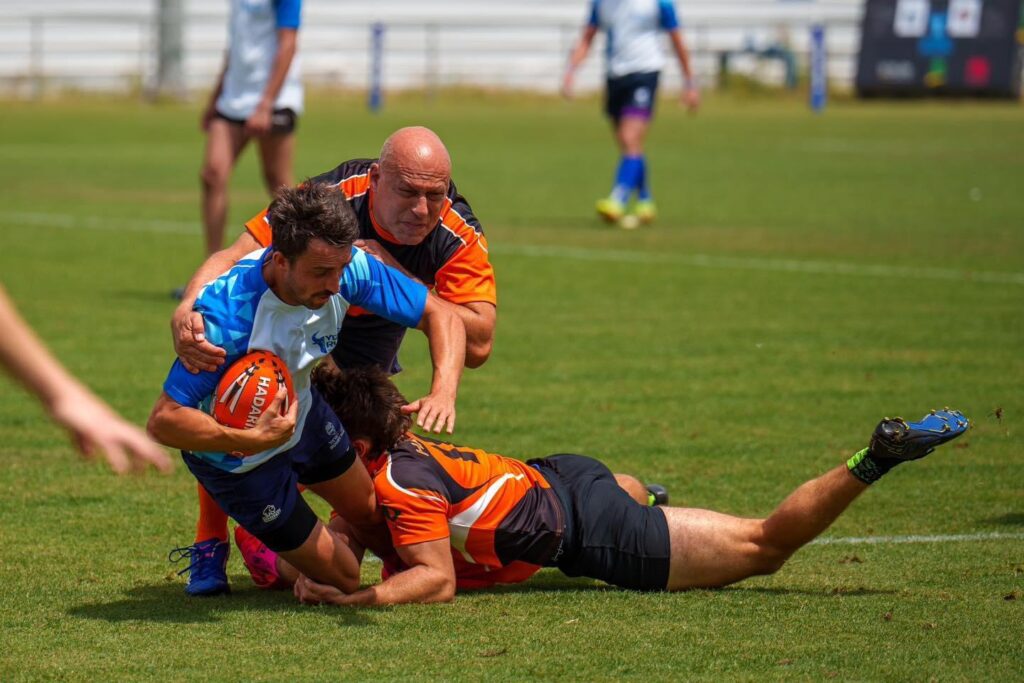Chairman of Rugby Israel, Offer Fabian speaks about the state of the sport following four years in office
(Ronen Dorfan)
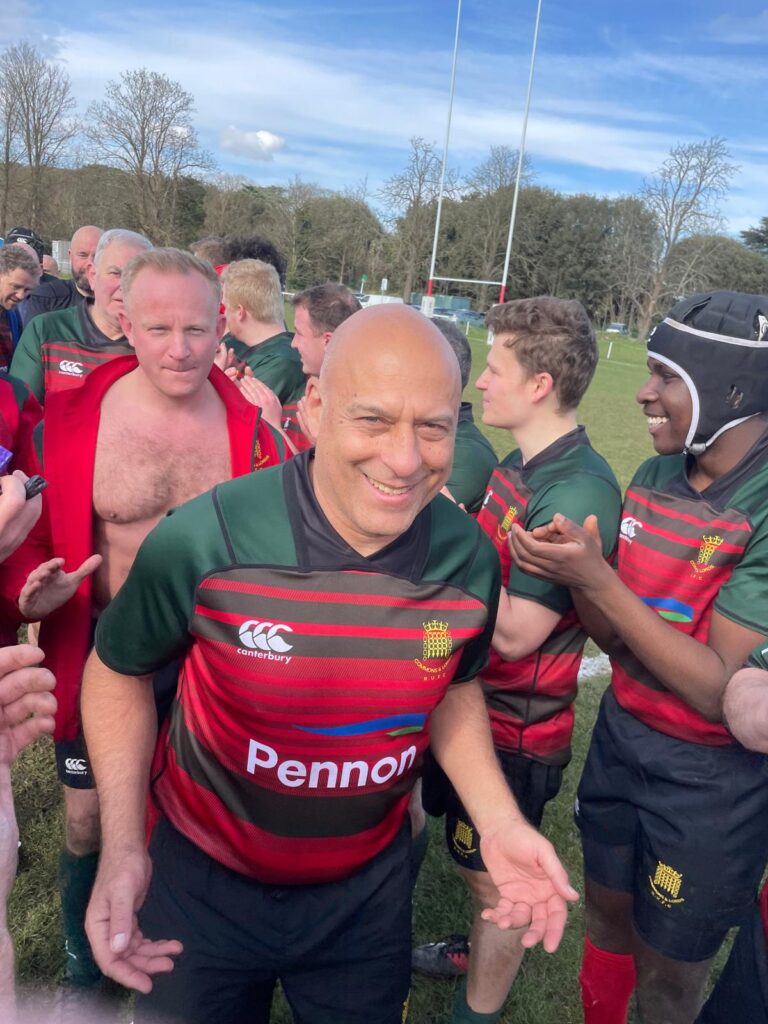
“You need a sexy story to sell to partners” (Photo: Private)
Four years… can seem like a week or like a decade
A bit of both I guess
Apart from covid and war, pretty peaceful times…
Sure…
So what exactly were the challenges of these two obstacle, specifically for Israeli rugby?
Paradoxically, COVID-19 helped a bit in the initial stage. Because we were in a significant debt. Since there were no activities and state funding is always paid 18 months retroactively, it helped close the deficit. We laid off employees and managed the association ourselves for two and a half years, until we got our heads above water. We then hired a CEO, Bonny Manor-Gottfried, and started building forward.
On the professional side, of course, the problems began afterward. We are a contact sport, 15 on 15. So even when judo was allowed to train 1 on 1, we were shut down. And when activities resumed, every sneeze shut down entire teams for five days. People couldn’t continue because they couldn’t afford to miss weeks of work due to training. Ra’anana was shut down three times. Then the Ministry of Sport decided that because we didn’t hold a regular league during the COVID, they would cut all our funding. In 2022 state funding for rugby was zero.
The war? You see. A decline in activity. Changes in the regional league plan that was supposed to include more teams. One player wounded in action. Players on reserve duty.
So we have what we call the “Ten Year Plan”. Reaching the World Cup or the Olympic Games.” When did it all begin?
Officially, it’s been a year. But its seeds were sown earlier, and for me, it’s the reason I’m in my role. It began at a training camp in South Africa at the Stellenbosch academy. The idea was to start fundraising; we made connections, but at that stage, we didn’t raise a single dollar.
But a few months later the Avraham Accords were signed. And we were the first team to utilise them and travel to the United Arab Emirates. It was a fascinating and emotional journey, and I brought with me a video recorded message from President Rivlin, which was projected on the giant screen. Around this story we raised a hundred thousand shekels in donations from people touched by the narrative who wanted to take part. And that was the beginning. And yes, I understood you always need a sexy story to sell.
A few months later, Rugby Europe announced the Super Cup competition. Seven countries, all from the European 2nd tier, were invited, including Georgia, Portugal, and others.The eighth was a wildcard. They invited bids.
And in our audacity, we submitted a bid. All other participants were from countries ranked in the top 20 or in the 20s. World Cup participants. And we’re ranked 60 and can’t see the World Cup through binoculars.
But our bid emerged the winner out of 13 proposals. The reason was that we hit on exactly what they were looking for. We told them, “If you give us the entry ticket, that’s the hammer we need to break the glass ceiling. We’ll turn Israel into an attractive destination for every Jewish rugby player in the world.”
And thus, Tel Aviv Heat was born. And the people behind it were the same people we cooked dinner for at Stellenbosch half a year earlier. They raised around three million dollars over the years, and one name I want to mention is Adi Raz, who is the chairman of Heat and the driving force behind the team.

I saw in your open letter a bit of disappointment from the Heat?
I’ll call it mixed feelings. It’s not disappointment with the Heat; it’s disappointment with ourselves and with the Heat. Clearly, the Heat as a team is a success story. I’m disappointed with our failure to fully integrate it into Israeli rugby. In the first year it worked better. But in the next two years it didn’t. There are mitigating circumstances, such as, as mentioned, COVID and war, and overall, the Heat hasn’t been in the country much. And it should be noted that there were some successful connections here and there.
You mean Heat players in the local clubs?
In the first year, we held a drafted for all Heat players. Who then trained with clubs. They didn’t get to play much due to schedules and such, but each club received two to three Heat players who came to training, helped with coaching, and supported their teammates. Some clubs hosted joint training sessions with the Heat. The result was presence at games, although we didn’t have many opportunities to host at home. In the following two years, when there was almost no connection, the local community was less interested.
But you have someone like Thomas Berman – he’s a player with the Heat, he’s the rugby director at the Hadarim club, and they joke that there’s almost no training session in the country where he’s not there in some capacity.
Yes, it’s a success story. Thomas Berman, for me, is the poster boy for this entire program and the ten-year plan. But in the first two or three years, Thomas Berman was the exception to the rule. When I have ten Thomas Bermans, then I’ll talk differently.
But I’m not saying this in a “we made a mistake” tone. Because what happened is that the success of the Heat brought people to believe that it’s possible. When the Heat played against the Romanians in the second season, at a certain point there were seven Israelis on the field and we won by about thirty points. True, some of the Israelis were substitutes and only played for a quarter of an hour, but Romania is a World Cup nation.
That’s how it starts. You crawl, then walk, eventually you run.
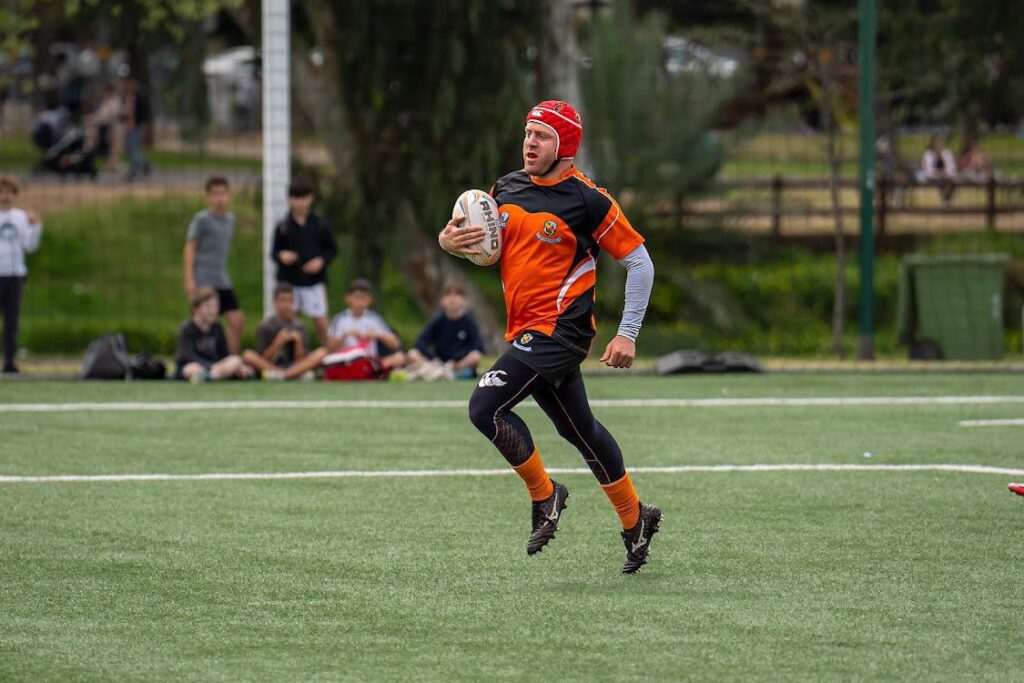
So maybe you’re just playing devil’s advocate about the Heat? Now Kevin (the national coach) says he’ll invite Leandro Gaon to play with the Heat. These are opportunities we couldn’t give youth players before.
This needs more time. That’s why I’m saying I’m not going to say we made a mistake, okay? Because the success of Tel Aviv Heat actually birthed the ten-year plan.
There’s likely going to be a change in Tel Aviv Heat. There’s no official decision yet, but the goal isn’t just to win the Super Cup, but to reach a point where we have 50% Israelis not only in the squad but also on the field. And to compete. Then in another two or three years, we’ll reap the rewards in Israel’s global rugby ranking.
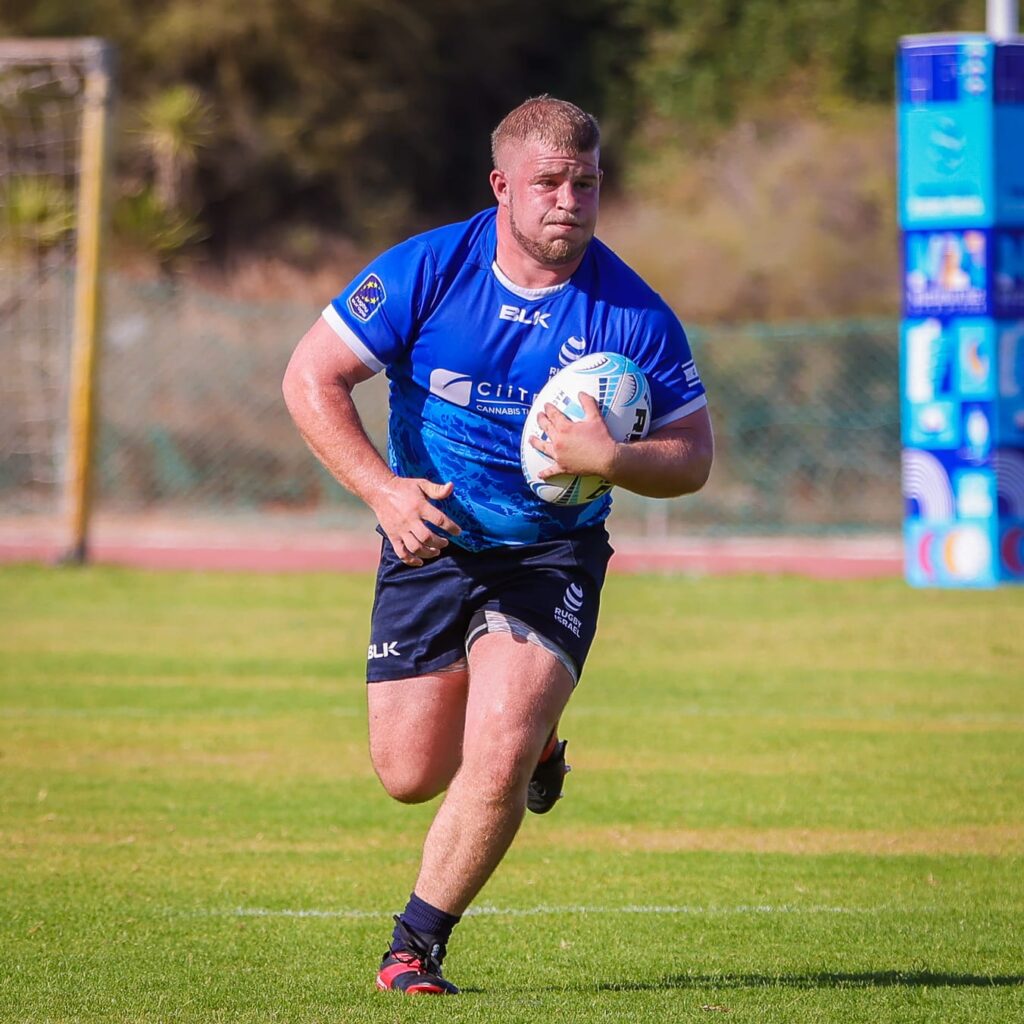
Is it realistic?
This weekend at the end of the regional league, the entire front line of the North, which executed the turnaround, was Israeli: Nitsan Reizel, Saar Geler, and Sinai Nans. Three kids who are not yet 25. And then you have Leandro Gaon and Sacha Partouche and, of course, Thomas. These kids played honorably against Armia, a first division team in Georgia, and against AI Matai from Fiji.
Mow it’s important to mention: where did Saar Geler learn to play hooker? At Tel Aviv Heat when he trained with them. He wasn’t even on their roster, but because there was war and they were in Portugal, Cyprus, and Hungary, we sent him to train with them. He was originally a flanker. They told him there, “You’re not fast enough for this position. But switch to hooker, learn a new position. Train, work on your body mass and gain 15 kilograms.” A year later, he’s in the regional league and playing hooker excellently against teams from Georgia and Fiji.
This is the message for everyone regarding the players in the pathway program. While Nazir (Gasanov) and Thomas and Nemani (Buliruarua) wait to complete their five years, they train with us, coach us, raise the level. We ran a women’s rugby-15 camp. We are just starting with it, so the level is very basic. And who coaches them on the field? Kevin, of course, Howard Mnisi, South Africa A player, Nazir Gasanov – Russian international, Xolisa Guma – Super Rugby player. It’s a luxury, and was made possible because of the Tel Aviv Heat and the regional league.
But I’m saying that more connection is needed. When we hosted the Black Lions from Georgia, the stadium was quite empty because Heat players trained less with the local clubss. But in a situation where there are 7-10 Israelis on the field, I can’t imagine a scenario where not all of Israeli rugby world comes.
The regional league 2024. Your initial thoughts
We will conduct more organized debriefing to see where we can improve, but overall it was a big success. I know from the players how much they enjoyed it. With the Israelis from my club, Leo and Sacha, I talk a bit and friends from other clubs also told me that for them it was a great privilege to train at such a level. So, from that perspective, the goal was achieved.
I’m also very pleased that the foreign players told me they had a good time. They enjoyed it even more than during the Tel Aviv Heat periods because they felt they were connecting. And these are not just words. I can tell you about “Big G” (Mhleli Dlamini) who helps a lot with a young man in our community who is dealing with issues. This connection wouldn’t have existed if it weren’t for the bond in which the players come and train with the clubs in the framework of the regional league.
Will we expand it in peaceful times?
When we sat down facing an empty slate, we talked about three Israeli teams and two or three foreign ones each year. That’s the scale that seemed reasonable given the potential players. This means an pool of about 80 Israeli players. This year we lost players to reserve service, so it wasn’t always feasible.
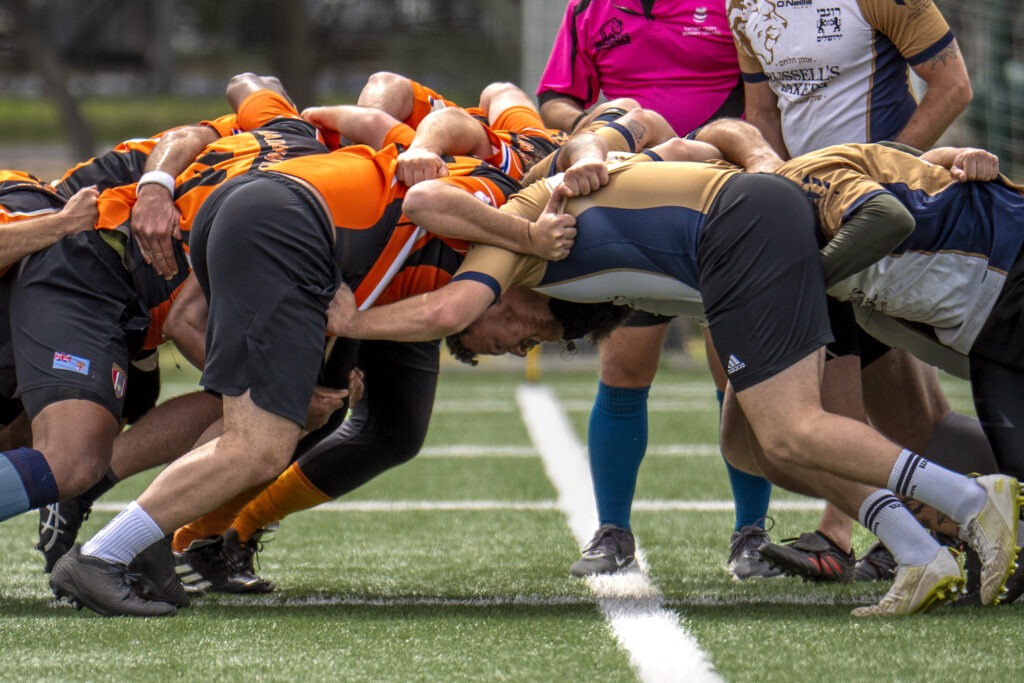
Where does the women’s game stand?
I want to say it’s developing, but it’s a bit difficult for me. Because every time we raise our heads and cross a certain border, then we stumble a bit. We went from six to eight clubs over this period, and this year it dropped back to seven. So, it’s clear that there’s difficulty with the war, but overall, I think the direction is good.
In terms of the women’s national team, over the past four years, they’ve moved up from third tier to second, In fact, in the last tournament they even finished one place above the men. I think they are managing excellently, and there’s a very, very good atmosphere there. This is true for the entire sport. This year, when there were missing players in the teams because players were uprooted from their homes or recruited to army, teams helped each other out.
There’s another big change that I didn’t initiate but I wholeheartedly commend. If you were to look at the union’s budgets and committees five to six years ago, you would see a section for the “Women’s Committee.” Then, female board members came and said, “Why is there a women’s committee? This isn’t another sport.” So, marketing became joint for everyone. And if there’s a professional committee for the national teams – it’s for both teams. And it’s working excellently. Today, they’re an integral part of all activities.
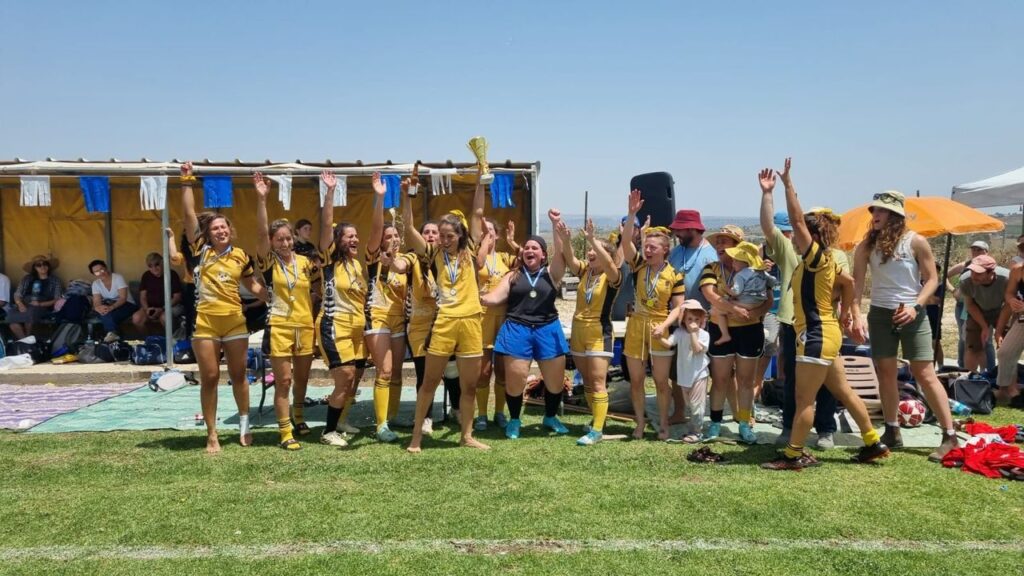
I don’t want to get into social analysis, but there’s a perception that rugby is centered around cities, kibbutzim, Tel Aviv, and less so, for example, in periphery towns – how do you deal with that?
The first critical issue is the ‘madman’, There was once a team in Be’er Sheva founded by Eduardo Cabral, may his memory be blessed, that even won a championship. It even included Bedouin players from the Negev. When someone as passionate as Eduardo finds a place as unlikely as Be’er Sheva, he creates rugby there. And his son does it today in Modi’in. A ‘madman’ is critical.
The second thing is infrastructure. It can’t be that one hundred percent of the field hours of a municipal ground go to soccer. Give a few hours to rugby. Give a few hours to Frisbee. Allow smaller sports to thrive and who knows – maybe some of them will yield results?
Kevin is a huge asset to the union and Israeli rugby. One of his strengths is that he knows what he’s good at. For example, he says he’s not a sevens coach and for several years now has brought in a different sevens coach each time. This year it will be Zac (Labalaba, the Fijian coach of Yizre-el and the Northern Stars). Part of our challenge is that Kevin works for us part-time. Fortunately, since Tel Aviv Heat was established he has half time position there too. Before that, he split his time between Israel and South Africa.
People always have opinions about coaches. But the guy creates a team from nothing that makes it to the (Super Cup) semifinals in the first year and two finals after that against rugby lions from Spain and Portugal. He brings in top-notch professionals we could only dream of. And what sets him apart is that he can lead a professional team to compete in the Super Cup and at the same time, stand on the field with beginners and teach.
An important part of his role is to build the next generation of coaches in Israel. All our ‘sports soldiers’ have undergone coaching courses on our expense, and we brought in a coach from Georgia to certify them to Level 2 of World Rugby. Along the way, the coach certified Kevin who can now certify people independently in Israel. This is a huge change.
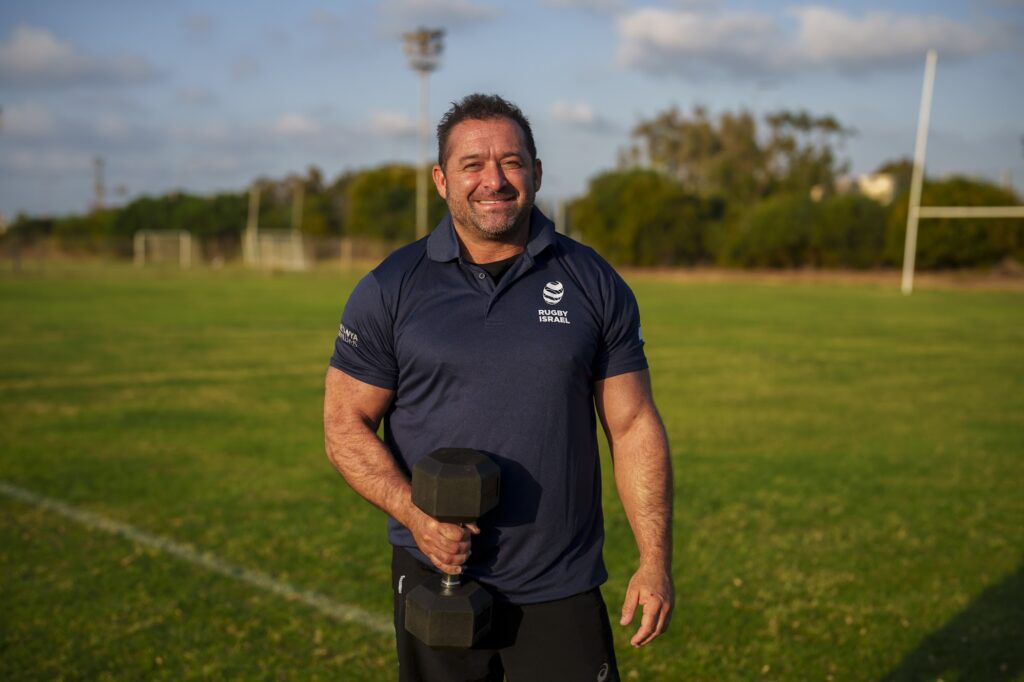
So for a final question: Why pursue such an ambitious plan like qualifying for the World Cup? After all, even if we do everything right, we might lose a crucial match due to a penalty or injury—luck plays a role in sports. Moreover, even if we work diligently, countries like Belgium, the Netherlands and Germany won’t just sit there idle. They also have ambitions, so it’s difficult to say that our chances are very high.
I’ll tell you the truth. I don’t really mind if we don’t reach the World Cup. Of course, I would be thrilled to be the chairman of the Rugby Israel or even just a fan in such a scenario, watching our team play with our flag waving. But the reason I’m doing this is because even if we don’t make it, I know what the plan achieves.
Let’s say we’re ranked around 20th and instead of 800 athletes today, we have 2500 or even 3000, or dare to dream, maybe even 5000. If we “only” achieve that, have we done wrong?
Overall, we’re not taking shortcuts. There’s a much cheaper and safer way to reach the World Cup. We could take 25 South Africans and Fijians and set up a camp for them in South Africa and somehow meet the naturalization requirements. Then we’d be like the Israeli baseball team. I have no desire for that.
But we’re bringing people here. I host players and others host them too. Because this plan is for Nitsan Reizel and Saar Galer, for example. Geler was already deep into plans to go to New Zealand for half a year, but when he heard of the regional league, he said, “Let’s see what it is, at most I’ll go to New Zealand next year.” This, to me, is a fantastic success of our plan.
Leo Gaon wasn’t on his way anywhere, Sacha wasn’t on his way anywhere, and Sinai wasn’t either, along with other players. Gilad Vardi made a short trip to Germany and came back. Not every promising player has the option to be abroad financially. We brought that here, despite all the turmoil around, but we did it for the young Israeli players.
